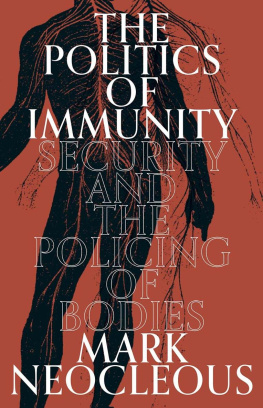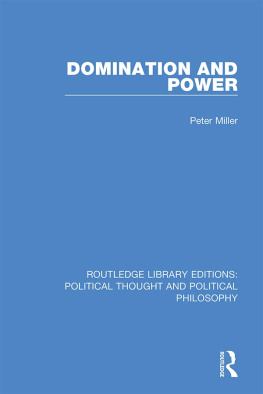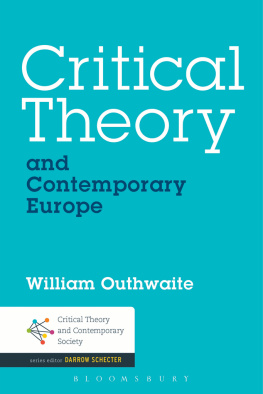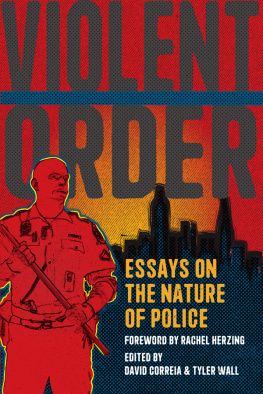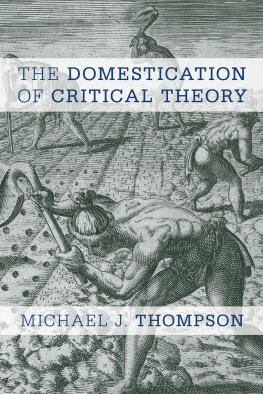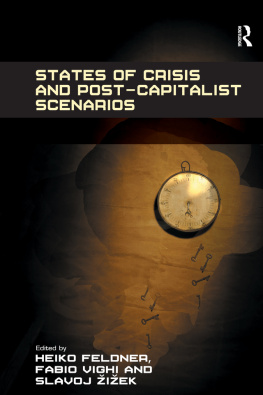Mark Neocleous - A Critical Theory of Police Power: The Fabrication of Social Order
Here you can read online Mark Neocleous - A Critical Theory of Police Power: The Fabrication of Social Order full text of the book (entire story) in english for free. Download pdf and epub, get meaning, cover and reviews about this ebook. publisher: Verso, genre: Politics. Description of the work, (preface) as well as reviews are available. Best literature library LitArk.com created for fans of good reading and offers a wide selection of genres:
Romance novel
Science fiction
Adventure
Detective
Science
History
Home and family
Prose
Art
Politics
Computer
Non-fiction
Religion
Business
Children
Humor
Choose a favorite category and find really read worthwhile books. Enjoy immersion in the world of imagination, feel the emotions of the characters or learn something new for yourself, make an fascinating discovery.

- Book:A Critical Theory of Police Power: The Fabrication of Social Order
- Author:
- Publisher:Verso
- Genre:
- Rating:5 / 5
- Favourites:Add to favourites
- Your mark:
- 100
- 1
- 2
- 3
- 4
- 5
A Critical Theory of Police Power: The Fabrication of Social Order: summary, description and annotation
We offer to read an annotation, description, summary or preface (depends on what the author of the book "A Critical Theory of Police Power: The Fabrication of Social Order" wrote himself). If you haven't found the necessary information about the book — write in the comments, we will try to find it.
Mark Neocleous: author's other books
Who wrote A Critical Theory of Police Power: The Fabrication of Social Order? Find out the surname, the name of the author of the book and a list of all author's works by series.
A Critical Theory of Police Power: The Fabrication of Social Order — read online for free the complete book (whole text) full work
Below is the text of the book, divided by pages. System saving the place of the last page read, allows you to conveniently read the book "A Critical Theory of Police Power: The Fabrication of Social Order" online for free, without having to search again every time where you left off. Put a bookmark, and you can go to the page where you finished reading at any time.
Font size:
Interval:
Bookmark:
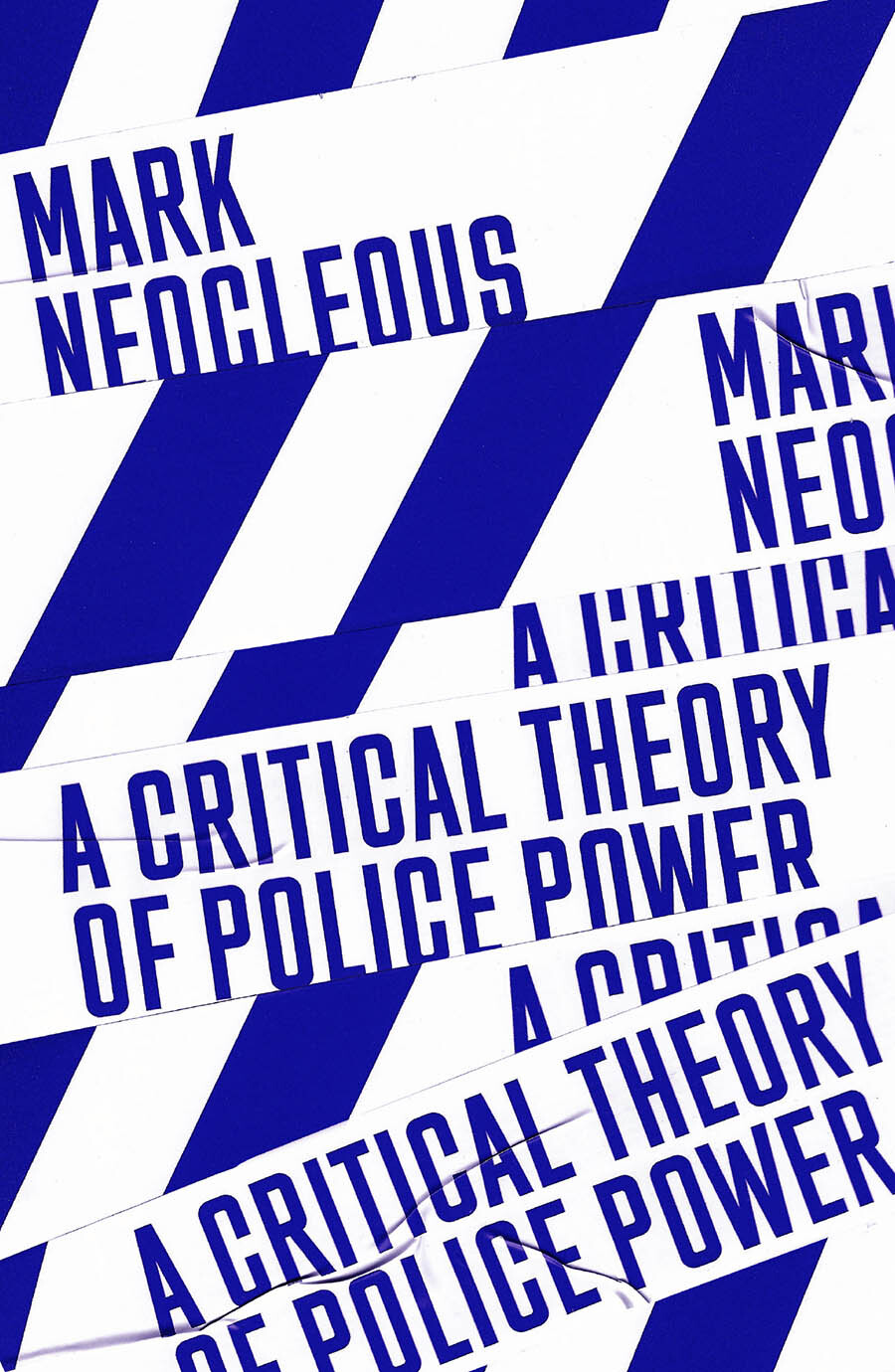
A Critical Theory of Police Power
A Critical Theory of Police Power
The Fabrication of Social Order
Mark Neocleous
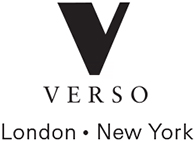
This edition first published by Verso 2021
First published as The Fabrication of Social Order:
A Critical Theory of Police Power by Pluto Press, 2000
Mark Neocleous 2000, 2021
All rights reserved
The moral rights of the author have been asserted
1 3 5 7 9 10 8 6 4 2
Verso
UK: 6 Meard Street, London W1F 0EG
US: 20 Jay Street, Suite 1010, Brooklyn, NY 11201
versobooks.com
Verso is the imprint of New Left Books
ISBN-13: 978-1-78873-520-9
ISBN-13: 978-1-78873-522-3 (UK EBK)
ISBN-13: 978-1-78873-521-6 (US EBK)
British Library Cataloguing in Publication Data
A catalogue record for this book is available from the British Library
Library of Congress Cataloging-in-Publication Data
A catalog record for this book is available from the Library of Congress
Typeset in Minion by Hewer Text UK Ltd, Edinburgh
Printed and bound by CPI Group (UK) Ltd, Croydon CR0 4YY
Contents
Introduction to the Verso Edition:
A Power Absolute and Indefeasible
Satin [her friend] inspired her with a terrible fear of the police. She was full of anecdotes about them According to her, the police arrested as many women as possible, in the hope of earning bonuses; they grabbed everybody and silenced you with a slap if you shouted, for they were sure of being defended and rewarded This fear of the law, this dread of the police was such that some women would stand paralysed in the doorways of cafes, while the raid was sweeping down the avenue Nana listened to these stories in growing terror. She had always been afraid of the Law, that unknown power.
mile Zola, Nana (1880)
They bombing on us now, a local musician shouts. They bombing on us now. And they got us blocked in from the other side. Are they shooting? Not quite, another person explains: Its tear gas!
The place is Ferguson, Missouri, in August 2014, and the context is the confrontation between the police and those protesting against the police killing of Michael Brown. The quotations come from a report on that incident in The Washington Post on the 14th of that month, but the refrain its tear gas! has in recent years become a familiar theme in news reports. Tear gas has been used against pro-democracy campaigners in Bahrain; Occupy protesters in Istanbul, Hong Kong and various American cities; those fighting for electoral reform in Uganda; students campaigning for educational reform in Santiago; anti-austerity protestors in Rio de Janeiro; schoolchildren in Nairobi protesting against the destruction of a playground; pro-democracy campaigners in Egypts Tahrir Square; fuelsubsidy campaigners in Nigeria; Buddhist monks in Thailand; Palestinians in the territories occupied and controlled by the Israeli Defense Force; Kashmir students in Srinagar; farmers protesting during the Tour de France; and prisoners in large numbers of Americas jails. This list could be much longer, but theres more than enough here to suggest that tear gas is clearly a popular weapon of choice for the state.
This begs a question: what is tear gas? The question is political, not technical: how do we make sense politically of the states use of tear gas against its own citizens? The standard answer to such a question is the one found in The Washington Post report just cited and goes something like this: the fact that a chemical agent once used in warfare (but now banned by the Chemical Weapons Convention of 1993) is being used by domestic police forces shows that policing has become focused less and less on the needs of the community and more and more on the execution of militarized violence against the states own citizens; this use of tear gas is a sign of the militarization of policing and indicative of the rise of paramilitary policing. In this vein, tear gas is invariably connected to the use of a whole range of other technologies of violence about which exactly the same claim is made, from water cannon to drones, stun grenades to tanks, body armour to armoured vehicles. All these technologies have led journalists, academics and activists to insist that what we are witnessing is, to give just a few of the formulations, the militarization of policing, a new military urbanism, the development of a paramilitary policing juggernaut, the militarization of law enforcement, the normalization of paramilitary policing, cops acting like soldiers, and armies in blue.
This police paramilitarization thesis, as we might call it, is a sterile argument, one which acts as a blockage in critical thinking about the police power. Much of the problem can be seen in the use of the para. The para is clearly meant to point to something important, something usually technological but also something that points to an important shift ; hence discussions of paramilitary policing are almost always discussions of its rise , just as the militarization thesis implies that policing is becoming militarized, suggesting a break with a past in which police and military powers were more clearly defined and categorically distinct. As well as suggesting a historical break, the police paramilitarization thesis also contains an ethical and political claim, namely that the police power should have no connection to the war power and that, when a form of technology that appears to be more appropriate for war zones is used by police forces, something has happened in which normal policing has been surpassed, with the police becoming something else: not quite fully military perhaps, but para-military. Inherent in the idea of para military policing is the assumption that normal that is, non-para policing is not about violence, but about something else, usually security, law and order, peace and tranquillity, the good of the community, policing by consent rather than through coercion. The thesis thereby perpetuates a beautiful fiction: that the police power and the war power are two distinct forces containing institutions that can and should be kept apart. The thesis thereby panders to part of the mythology of the liberal state: the police power deals with crime whereas the war power fights wars; the police power keeps the internal peace whereas the war power defends the nation from external threats; the police power manages civilians whereas the war power confronts combatants; the police power confronts situations of law and (dis-)order whereas the war power confronts an international enemy. The key question that emerges from this myth, which then becomes part of the myth itself, is to ask how the institutional differentiation of these two powers is to be regulated in order to avoid the drift towards the kind of police state with which militarized policing is associated.
Even a cursory knowledge of the history of policing reveals just how close the key institutions of the police power and the war power have been. Take any of the technologies listed above and one finds that they are born into the world of police power. As soon as tear gas was invented, for example, it was used by French police against Parisian gangs prior to WWI, by a range of states in policing their colonies in the 1920s (colonial war, yet defined by such states as police actions), and being recommended by Instructors of Police Science as an effective weapon against unruly mobs, crowds of civilians and groups of Tear gas has been a police technology since its inception and the same can be said of other technologies of violence with an equally long history, such as water cannon, or more recent technologies, such as the drone. This historical use of technologies of violence by various state departments is merely part of the institutional overlap between those same departments and should be no surprise because the technologies were invented as technologies of
Next pageFont size:
Interval:
Bookmark:
Similar books «A Critical Theory of Police Power: The Fabrication of Social Order»
Look at similar books to A Critical Theory of Police Power: The Fabrication of Social Order. We have selected literature similar in name and meaning in the hope of providing readers with more options to find new, interesting, not yet read works.
Discussion, reviews of the book A Critical Theory of Police Power: The Fabrication of Social Order and just readers' own opinions. Leave your comments, write what you think about the work, its meaning or the main characters. Specify what exactly you liked and what you didn't like, and why you think so.

